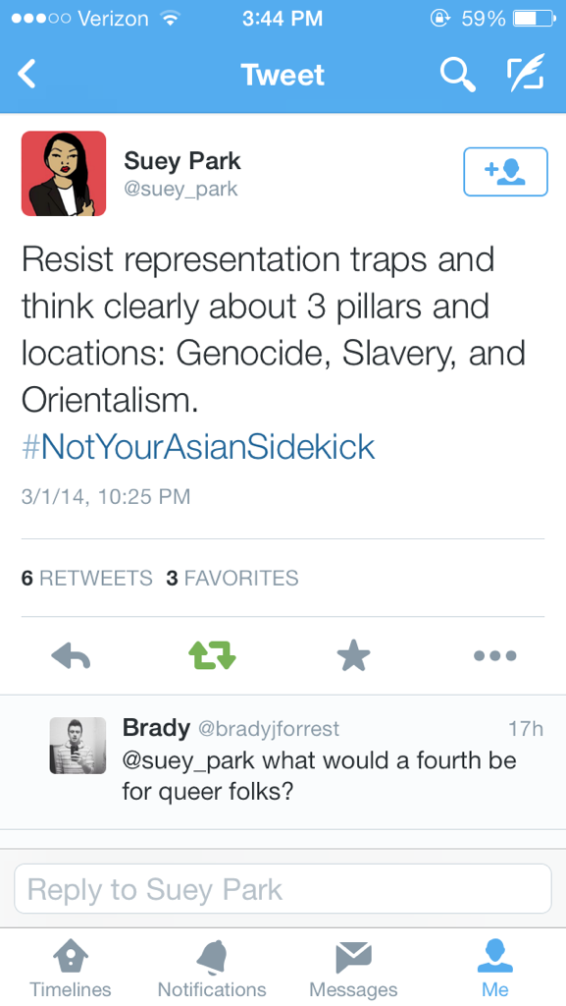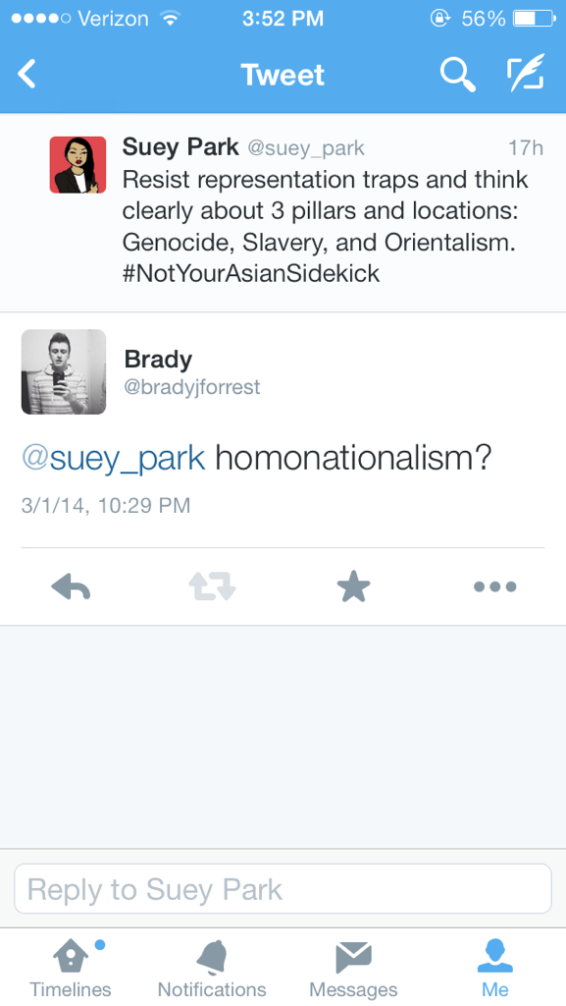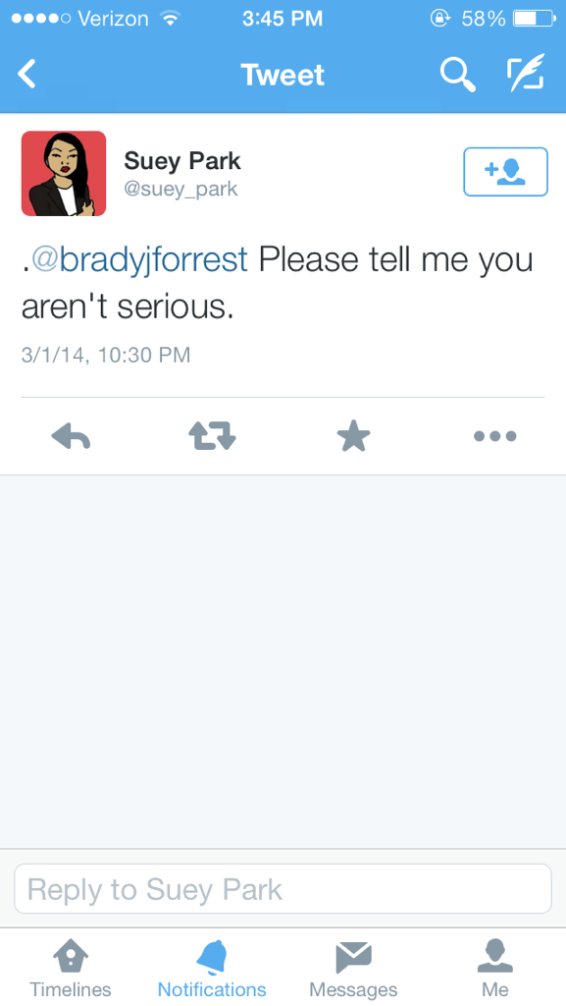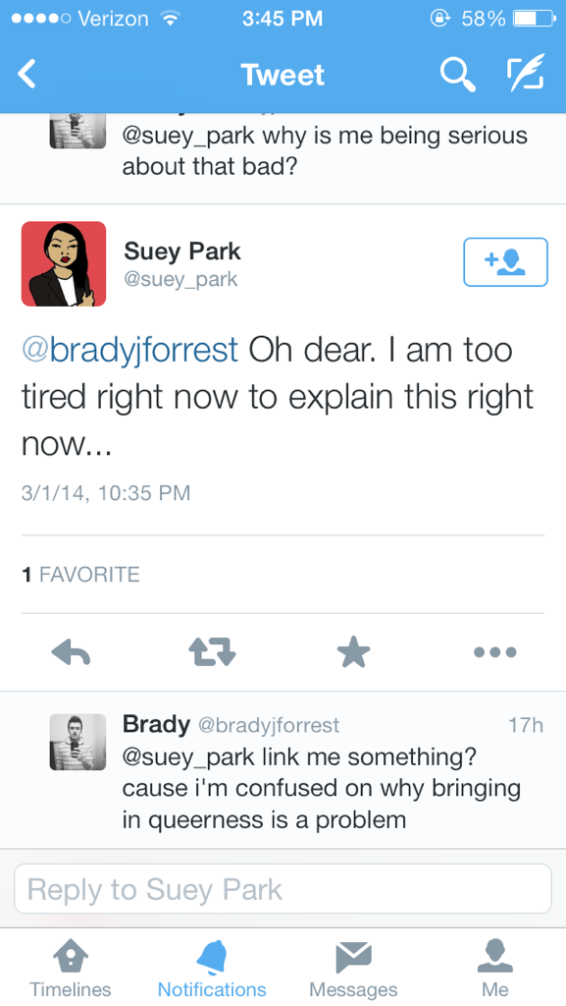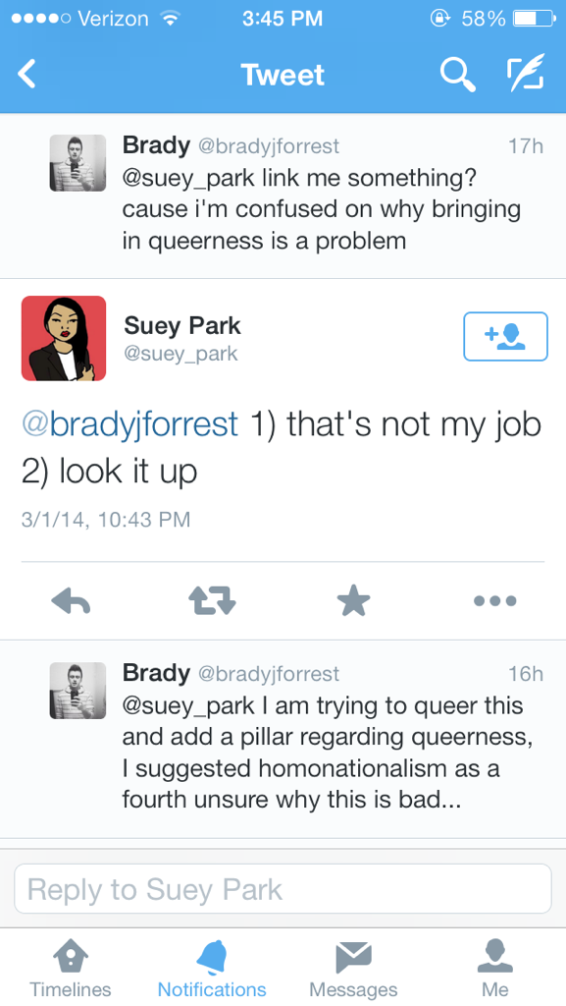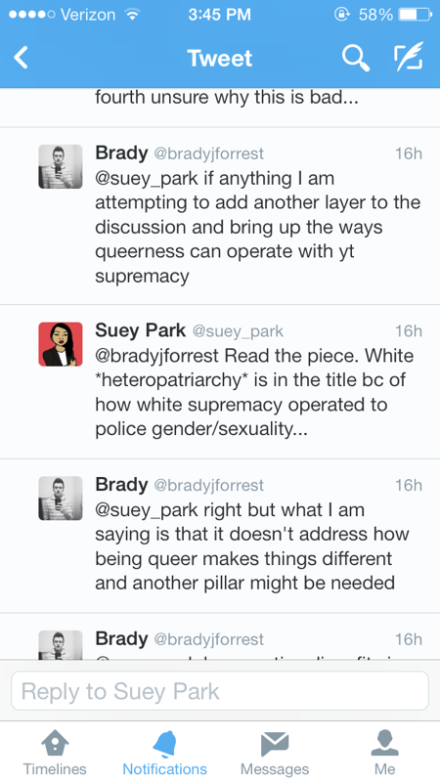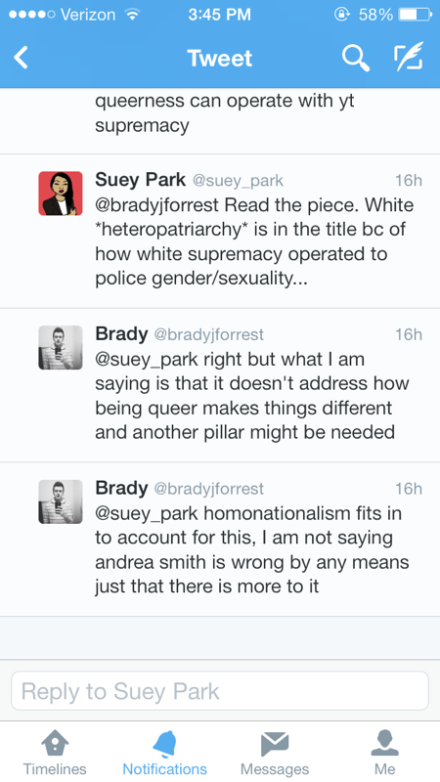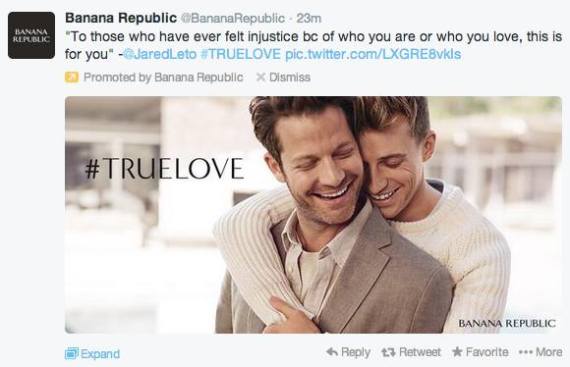Or That one weekend when Suey Park blew me off, Jared Leto forgot trans* folks, and Banana Republic tried to make money off it all
This past Saturday night I found my twitter feed taken over by Suey Park posting quotes and comments regarding this piece by Andrea Smith (I strongly encourage folks at least look it over so they have some context for what’s to come). I came into this in the middle of her tweeting and didn’t quite understand where exactly this was coming from or the context but nonetheless enjoyed the tweets immensely, I favorited and retweeted a few of Park’s posts. I one tweet found incredibly interesting and replied to Park and the following ensured:
After my last tweet Park responded with “STOP” and later deleted the tweet.
I want to start by saying that my intention was not to argue, discredit, or in any way disagree with what Park was tweeting about or Smith’s work. I read Smith’s piece a long time ago and found it incredibly insightful and it helped informed how I understood and understand whiteness. My intention, which I tried to get across in a few sets of 140 characters, was to both broaden our understanding of how different people are impacted by whiteness and also provide a way to hone in on the experiences of queer people, especially queer people of color (more specifically queer womyn of color) given the nature of the article. I originally followed Park because of her amazing work on trans* justice as well as her activism on racial justice and racism. In seeing her interactions with fellow progressives and with my own minimal interactions with her on twitter I was expecting a very different response than what I got. I was hoping we could have a discussion and build from Smith’s work to more accurately place queer experiences and understand how representations of queerness can contribute to and perpetuate white heteropatriarchy. I feel what ended up happening was, as I bluntly put it in the title of this piece, Park blew me off. Yes she replied to me, but she in no way engaged the issue I was attempting to bring up. I wanted to engage with someone I saw as an informed progressive person who had differing and valuable experiences that might lend itself to a unique take. I wanted to continue the discussion Andrea Smith started down a queer path but was met with disbelief, discouragement, and condescension.
I believe that a fourth pillar is needed and that Jasbir Puar’s term homonationalism is that pillar. In their article, Maya Mikdashi explains Puar’s homonationalism as: “the idea that LGBTQs the world over experience, practice, and are motivated by the same desires, and that their politics are grounded in an understanding that ties 1) the directionality of their love and desire into a stable identity and 2) that stable identity into the grounds from which one speaks and makes political claims.” I see homonationalism as a crucial fourth pillar because while the other three must include queer people because queer people exist in communities of color and have been subject to slavery, genocide, and orientalism, those three do not directly identify the ways in which queer people deal with representation traps and the ways whiteness operates in, around, and on queer people and spaces.
On the Backs of Trans* People
In a time when organizations such as Human Rights Campaign have hijacked the queer movement and turned it into something whiter, more respectable, and more normative, the state of Israel actively engages in pink washing as a means of excusing humyn rights violations and occupation, and “allies” such as Macklemore and Jared Leto are seen by many as representatives for and saviors of queer people, we need to name what is occurring. I believe that terms such as Lisa Duggan’s homonormativity and Jasbir Puar’s homonationalism are crucial to understand, critique, and ultimately combat these things.
All of this academic language seems detached and the fact that we are arguing this might seem irrelevant to the struggle but I think we need to have language to help us name and discuss events in popular culture one example of this is that I will be focusing on is Jared Leto’s portrayal of a trans womyn in Dallas Buyers Club, his Oscars acceptance speech, and the subsequent lifting of portions of that speech by a corporation as a means of tokenizing for profit.
Before we get started it should be said that a cis man winning best supporting actor for his portrayal of a trans womyn is an issue in itself. The fact that a trans womyn was not cast to play a trans womyn is appalling. There are a number of trans womyn who could have been cast who would no doubt have done a better job than Leto. Once Leto was cast we would see his failure to understand his privilege and at the very least not offend and insult trans * people. Lucian has brilliantly explained many of the problematics of Leto’s casting on twitter and with his latest article:
“Why does Hollywood not get cis women to play trans women? Because they believe trans women are actually men or closer to men than to women.”
“A man playing a trans woman reinforces the idea that trans women are really men who are just acting or playing dress up.”
“Telling cis actors to not play trans* roles is not the same as trans* people playing cis roles. Trans* people are only allowed trans* roles.”
“If you argue for cis people to play trans* people, you are arguing that our identities are just an act, a role, and not part of us.”
All of this leads up to the night of the Academy Awards where Leto won for best supporting actor (an award given to men in a supporting role). As Lucian explains there are a number of issues with that and I hope to use that as the context to further discuss his acceptance speech, what was and was not said, and the implications of the speech. I want to use his speech and what occurred after to make the case for homonationalism as the fourth pillar.
Leto ended his acceptance speech with “tonight I stand in front of the world with you and for you” but was he really with and for LGBTQ people? The short answer is no. Not once did he directly mention any of the communities represented with the acronym LGBTQ. For someone who played a trans womyn in the film you would hope he would at least say the name some influential trans womyn or at least broadly mention the trans community. Instead Leto chose to address the revolutions and uprisings in the Ukraine and Venezuela. While he did say that his Oscar was for the millions who have died from AIDS and anyone who “has ever felt injustice because of who they are or who they love.” To put it bluntly, Leto was paying lip service and offered nothing to queer communities. If he was truly with and for LGBTQ people he should have made his acceptance speech about LGBTQ people. He should have contextualized the ways institutions, including Hollywood, stigmatize and oppressed LGBTQ people and the reason he was even cast to play a trans womyn over many capable actresses who are trans*. He should have stated why thirty six million people have died of AIDS and the ways AIDS affects people of color disproportionately because of institutional vilification of communities of color, especially queer and trans* communities of color. Leto should have used his time to advocate for ENDA (employment non-discrimination act). He should have refused to accept the award himself and instead allow a trans womyn to use that podium to advocate for herself and her community. Instead he delivered a disappointing speech that gave more thanks and paid more respect to Hollywood elites than the trans* communities he stepped on in order to win that award. Rather than advocate for queer and trans* people he reduced systematic and institutional oppression to feelings of injustice. To quote Ngọc Loan Trần:
“oppression is not a feeling. reducing it to how a community ‘feels’ they are being treated minimizes the violences that are enacted upon them, makes structural injustices a matter of perception of individual acceptance or rejection of oppressive conditions. oppression creates feelings, definitely. it creates trauma, internalized conflict, dissonance, confusion. but oppression is not a feeling.”
In the end this only reaffirms what many progressive people have seen time and time again, trans*, queer, and of color bodies are only awarded when they are not actually trans*, queer, or of color, with few respectable non-threatening exceptions.
Jared Leto’s speech offers us a front seat to homonationalism in the ways white straight cis bodies are made central to queer and trans* communities despite not being part of the community. Leto is a prime example of the way homonationalism steals queer and trans* agency to tell their own stories and offers up a respectable, simplistic, white, and normative understanding who queer and trans* people are and what they want. The idea that trans* people are not able to tell their own stories and that a white straight cis man is more capable to do so reinforces that trans* people don’t have diverse and differing needs, that this man is fully capable of presenting trans* people both in his role in the movie and as the actor portraying a trans womyn. In giving him the platform to advocate for trans* issues (the underlying problematic of him being the advocate, being cast for the part, and his failure to address trans* issues or people are additional problems) it narrows and simplifies trans* people’s needs and identities. In Jared Leto and his speech we see homonationalism at work as a pillar of white supremacy, a white straight cis man hijacks the opportunity for the presence of marginalized people while institutions get to pat their own backs for awarding someone who portrayed a trans womyn. Leto allows marginalized people to be mentioned but not seen or heard from, instead we have the continued propping up of whiteness, straightness, and cisness continuing the idea of that acceptance and advocacy without any real action is enough.
Erasing People for Profit
What we do see, within minutes of Leto ending his acceptance speech, is the following Banana Republic advertisement on twitter
The ad takes an existing photo part of a larger campaign by Banana Republic to target LGBTQ (although mostly the G) people and adds a quote from Leto’s speech and the hashtag #true love. In order to understand, contextualize, and combat advertisement like this the first step is to name it and thankfully Puar has done that part for us with homonationalism. This ad whitewashes, normalizes, pacifies, tokenizes, comodifies, simplifies, and reduces queer and trans* people and homonationalism allows us to connect these things and understand how they prop up white heteropatriarchy.
This Banana Republic ad puts forward a symbol of the LGBTQ community in the form of engaged couple Jeremiah Brent and Nate Berkus. The ad itself depicts queer people as white (hegemonically) attractive cis men. This in itself is problematic because, similar to Jared Leto being cast as a trans womyn, a community is being narrowed to the most acceptable and respectable members. We also must remember that this image of queerness is being tokenized as a means for a corporation to profit off of LGBTQ people while simultaneously, through the ad, erasing the existence of people of color, women, and trans* people as members of the queer community from the publics eye and putting forward what queer bodies are deemed valuable. For Brent and Berkus to be cast also sends a message to queer and trans* people, that these two are what is acceptable and what everyone should strive to be. Beyond this there is the implicit message that this is what LGBTQ people look like, and because of that there is the subliminal equating of LGBTQ with white. This is no accident, there is a growing trend of ever increasing visibility of gay white middle class men which has translated into policies that primarily focus on them while leaving queer people of color and trans* people out.
Both Brent and Berkus fit into roles that are often understood to be stereotypically “gay” (Allow me to be perfectly clear, I fully support how either choose to live their lives and make a living and I am not criticizing them but rather that a corporations tokenizes them to present a symbol for queerness and love), Brent is involved in the fashion industry and Berkus is an interior designer. For Banana Republic to use these two sends the signal of what is expected for queer trans* folks to do with their lives as well as what is viewed as s respectable and accepted relationship. Continuing with the critique of respectability the pictue highlights “true love” and shows a monogamous non-threatening (read white upper middle class) soon to be married gay couple. This defining of true love uses nice sounding rhetoric to narrowly define what love is for LGBTQ people and present an ideal or desired understanding of what good “true” relationships look like. This furthers the vilification of non-normative relationships and identities, which ultimately does a disservice and even harm to LGBTQ people. To take the ad’s presentation of true love even further it highlights that these two attractive white cis male bodies as able to have true love and I would argue that the implicit message it sends is that these are the people who are capable and worthy of true love. This limiting and constricting discourse contributes to hegemonic beauty standards as well as racism within queer communities.
So what does this all mean? It means that LGBTQ people are being reduced to only the most privileged within the community. The queer movement has become solely about policies and efforts that help those who need it the least within the community. It depicts LGBTQ people as a homogenized group who only want marriage, clothing from Banana Republic, and inclusion into the white heteropatriarchal society as it exists. Homonationalism is at work here reducing, pacifying, and homogenizing LGBTQ people to make it fit under the roof of white heteropatriarchy that is held up by slavery, genocide, and orientalism. This is why I wanted to discuss representation traps and the three pillars with Suey Park. The issues that truly matter for so many LGBTQ people are being brushed aside because they challenge or do not fit in with white heteropatriarchy. In Jared Leto’s casting, actions, and speeches as well as the Banana Republic campaign, queer and trans* people are being erased and slenced. The ability to put forward and pass substanitive laws that offer equitable treatment and protections are being weakened because from what the average person sees, they are not needed. This could not be further from the truth. The issue is not that violence and bigotry don’t exist, but rather that queer and trans* voices are not given the platform to speak on their experiences and point them out. As we have seen just this past weekend at the Academy Awards, communities are constantly under attack because of homonationalism and it is important to understand how and why this is happening so that people stop paying lip service to the LGBTQ people and start acting in solidarity with them.
